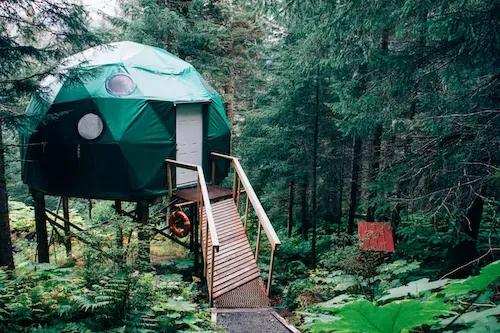List of What You Read
Airbnb: The Biggest Vacation Rental Platform
Airbnb is a vacation rental platform that allows people to list, discover, and book unique accommodations around the world. It was founded in 2008 by Brian Chesky, Joe Gebbia, and Nathan Blecharczyk, who saw an opportunity to create a more personal and authentic alternative to traditional hotels.

Since its inception, Airbnb has grown into a global community of hosts and travelers, with over 7 million listings in more than 100,000 cities in over 220 countries and regions. It offers a variety of accommodations, from apartments and houses to treehouses and castles, and has become a popular choice for travelers looking for a local, authentic experience.
In addition to providing a platform for people to list and book accommodations, Airbnb also offers services such as Experiences and Adventures, which allows travelers to participate in activities and events hosted by local experts, and Airbnb for Work, which helps companies find short-term rentals for business travel.
Overall, Airbnb has revolutionized the way people travel and experience new places and has become a household name in the world of travel and hospitality.
History of Airbnb:
The history of Airbnb can be traced back to 2007 when co-founders Brian Chesky and Joe Gebbia were struggling to pay their rent in San Francisco. To make ends meet, they converted their apartment into a small bed and breakfast, offering three air mattresses and breakfast to attendees of a design conference who were unable to find lodging due to a hotel shortage.

This idea proved to be successful, and Chesky and Gebbia decided to create a website called “AirBed & Breakfast” to connect people looking for a place to stay with those who had space to rent. They recruited their friend Nathan Blecharczyk to help them build the site, and together, the trio launched Airbnb in 2008.
In the beginning, Airbnb focused on short-term rentals in major cities, offering a range of accommodations including apartments, houses, and even treehouses. Over time, the company expanded to include more types of properties, such as villas and castles and added features like Experiences and Adventures, which allow travelers to participate in activities and events hosted by local experts.
Today, Airbnb is a global company with over 7 million listings in more than 100,000 cities in over 220 countries and regions. It has become a popular choice for travelers looking for a local, authentic experience, and has disrupted the traditional hotel industry by offering a more personal and unique alternative to traditional accommodations.
How Airbnb works:
Airbnb is a vacation rental platform that allows people to list and book unique accommodations around the world. Here’s how it works:

Listing: Hosts can create a listing for their property on Airbnb by providing information about the location, amenities, and availability of their accommodation. They can also set their own price and house rules.
Searching: Travelers can search for accommodations on Airbnb by specifying their destination, dates of travel, and the number of guests. They can also filter their search by price, type of property, and other amenities.
Booking: When a traveler finds a listing they are interested in, they can send a booking request to the host. The host can accept or decline the request, or send a counteroffer. If the request is accepted, the traveler is required to pay a deposit or the full amount up front.
Staying: Once the booking is confirmed, the traveler can communicate with the host to coordinate the details of their stay, such as arrival and departure times. During their stay, travelers can rate and review their experience on the Airbnb platform.
Payment: After the traveler’s stay is complete, Airbnb processes the payment from the traveler and transfers the agreed-upon amount to the host. Airbnb also collects a service fee from the host for providing the platform and handling the booking process.
Overall, Airbnb makes it easy for travelers to find and book unique accommodations around the world, and for hosts to list and rent out their properties to travelers.
Benefits of using Airbnb:
There are many benefits to using Airbnb as a traveler or a host. Some of the main benefits include:
Wide range of accommodations: Airbnb offers a wide range of accommodations, including apartments, houses, villas, treehouses, and even castles. This allows travelers to find a unique and authentic experience that suits their needs and preferences.

Local experiences: Airbnb offers a variety of Experiences and Adventures, which are activities and events hosted by local experts. These experiences allow travelers to discover the local culture and traditions in a more authentic and immersive way.
Affordable prices: Airbnb’s prices are often more affordable than traditional hotels, especially for longer stays. Hosts can set their own prices, which allows for a wide range of options for travelers on different budgets.
Convenient booking process: The booking process on Airbnb is easy and convenient. Travelers can search for and book accommodations on the platform and communicate with the host to coordinate the details of their stay.
Trust and safety: Airbnb has a number of policies in place to ensure the trust and safety of both hosts and travelers. These include a host guarantee, which provides protection for hosts in the event of damage to their property, and a community commitment, which outlines expectations for hosts and travelers to treat each other with respect and consideration.
Overall, Airbnb offers a range of benefits for both travelers and hosts, making it a popular choice for vacation rentals.
Controversies surrounding Airbnb:
As with any large company, Airbnb has faced a number of controversies since it was founded. Some of the main controversies surrounding the company include:
Impact on housing markets: One of the main criticisms of Airbnb is that it can contribute to housing shortages and affordability problems in certain cities. Critics argue that when landlords and homeowners opt to list their properties on Airbnb instead of renting them out to long-term tenants, it can reduce the number of available rental units and drive up rental prices.

Lack of regulation: Airbnb has faced criticism for operating in a largely unregulated space, which has led to concerns about safety, quality of accommodations, and accountability. Some cities have attempted to regulate Airbnb by requiring hosts to register their listings or pay taxes, but the company has often resisted such efforts.
Discrimination: Airbnb has faced accusations of discrimination, with some users reporting that they have been denied accommodations or experienced discrimination from hosts based on their race, religion, or other characteristics. Airbnb has implemented a number of policies to address these issues, including prohibiting discrimination and requiring hosts to sign a nondiscrimination policy.
Impact on local communities: Some communities have expressed concerns about the impact of Airbnb on their neighborhoods, arguing that it can lead to an increase in noise, traffic, and other problems. Some cities have attempted to limit the number of nights that hosts can list their properties on Airbnb in an effort to mitigate these impacts.
Overall, while Airbnb has faced a number of controversies, the company has taken steps to address these issues and has continued to grow and expand its operations globally.
Alternatives to Airbnb:
There are several alternatives to Airbnb that offer similar services for booking vacation rentals and unique accommodations. Some of the main alternatives to Airbnb include:
Vrbo: Vrbo (Vacation Rentals by Owner) is a vacation rental platform owned by Expedia Group. It offers a variety of accommodations, including apartments, houses, villas, and cabins, in destinations around the world.

HomeAway: HomeAway is a vacation rental platform that offers a wide range of properties, including houses, apartments, and villas, in destinations around the world. It is also owned by Expedia Group.
Booking.com: Booking.com is a hotel and vacation rental booking platform that offers a variety of accommodations, including apartments, houses, and villas, in destinations around the world.
FlipKey: FlipKey is a vacation rental platform owned by TripAdvisor that offers a variety of properties, including apartments, houses, and villas, in destinations around the world.
Airbnb Plus: Airbnb Plus is a sub-brand of Airbnb that offers a curated selection of high-quality, professionally inspected properties that meet certain standards for design and comfort. These properties are marked with a “Plus” icon on the Airbnb platform.
Overall, these alternatives to Airbnb offer similar services for booking unique accommodations and vacation rentals and may be worth considering for travelers looking for a local, authentic experience.
Conclusion:
In conclusion, Airbnb is a vacation rental platform that allows people to list and book unique accommodations around the world. It was founded in 2008 by Brian Chesky, Joe Gebbia, and Nathan Blecharczyk, and has since grown into a global community of hosts and travelers, with over 7 million listings in more than 100,000 cities in over 220 countries and regions.
Airbnb offers a wide range of accommodations, from apartments and houses to treehouses and castles, and has become a popular choice for travelers looking for a local, authentic experience. In addition to accommodations, Airbnb also offers services such as Experiences and Adventures, which allow travelers to participate in activities and events hosted by local experts, and Airbnb for Work, which helps companies find short-term rentals for business travel.
While Airbnb has faced a number of controversies, including its impact on housing markets and regulation, as well as accusations of discrimination and negative impacts on local communities, it has taken steps to address these issues and has continued to grow and expand its operations globally.
There are also a number of alternatives to Airbnb, such as Vrbo, HomeAway, Booking.com, FlipKey, and Airbnb Plus, that offer similar services for booking unique accommodations and vacation rentals.
